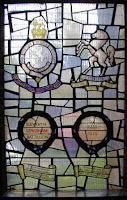As part of the First World War commemorations the Government is working alongside partners including the Heritage Lottery Fund, Commonwealth War Graves Commission and Imperial War Museums, on a series of national remembrance events, an extensive cultural programme and educational schemes.
As part of this programme of events, the Department of Communities and Local Government would like to help local communities to commemorate Victoria Cross recipients of the First World War by designing and producing commemorative paving stones. The paving stones will be presented to councils across the country in the areas where the Victoria Cross Award winners were born, beginning in 2014.
Lewisham Heritage knows of 6 First World War recipients of the Victoria Cross who were born in the borough. Details are listed on our
Lewisham War Memorials wiki
DCLG is holding a national competition open to everyone to design these paving stones. The conditions of entry are:
- The design must be able to fit a 600mm by 600mm paving stone, and submitted on A4 paper.
- Designs should incorporate some aspect of the Victoria Cross medal.
- Designs should allow space for the name of a Victoria Cross recipient, the date that the Victoria Cross was awarded and for a QR reader.
- Drawings, paintings and computerised designs will all be considered as acceptable media.
The winning design will become a high-profile and enduring symbol of the Centenary commemoration, and used across the country on every commemorative paving stone of the campaign.
Please submit designs electronically to:
VCdesigncomp@communities.gsi.gov.uk (no more than 15mb)
Or by Post to:
Sally Sealey
5th Floor Zone B2
Eland House,
Bressenden Place,
London
SW1E 5DU
The deadline for all entries is
5pm Friday 4th October 2013
You can find out more on the
Gov.uk website




